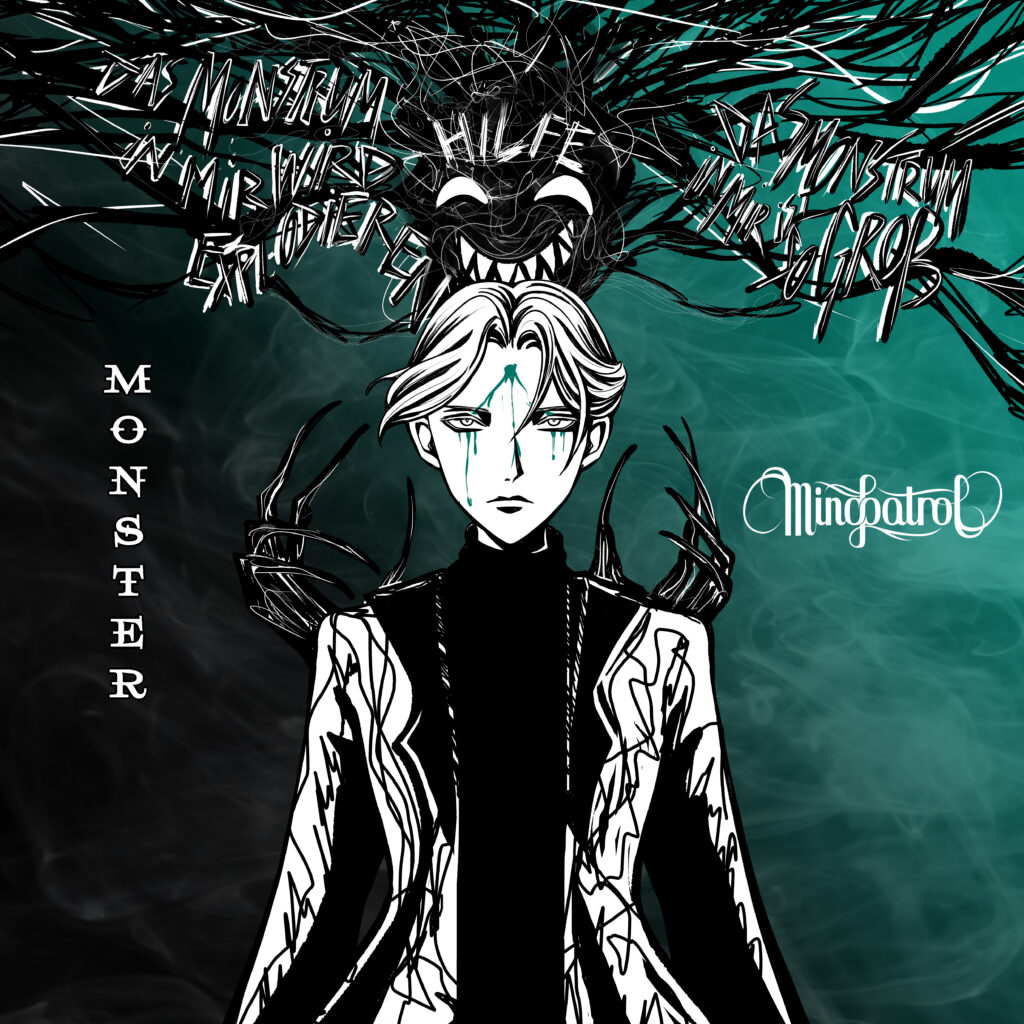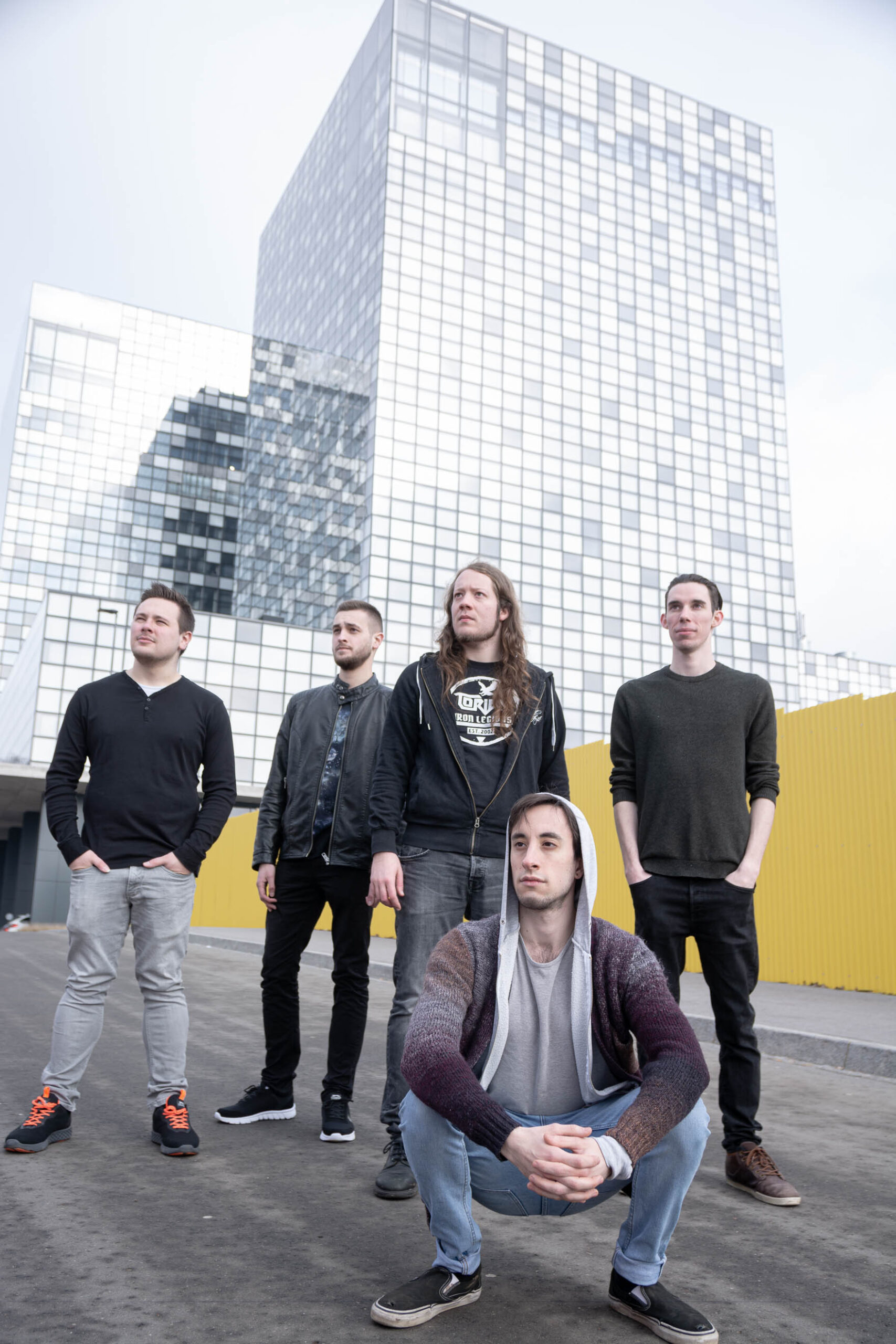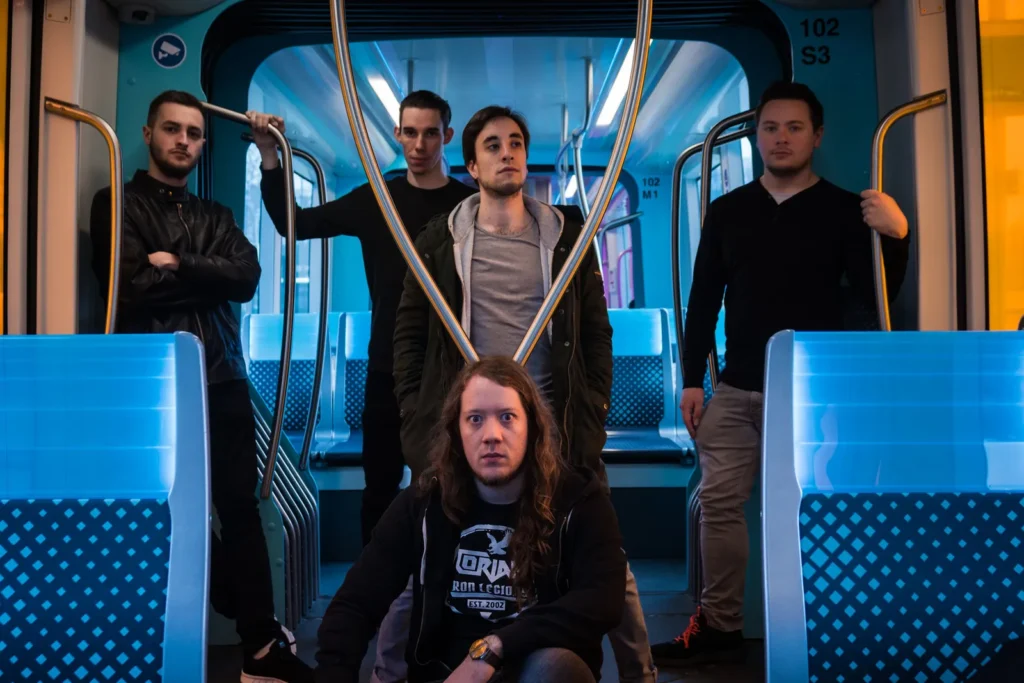Mindpatrol, the Luxembourgish progressive metal band known for their intricate storytelling and dynamic soundscapes, recently released their EP titled “Monster,” a departure from their usual approach of crafting original narratives. Instead, they adapted Naoki Urasawa’s acclaimed manga series into a musical journey. In this exclusive interview, Mindpatrol delves into the inspiration behind this project, the process of translating the manga’s themes into music, and the collaborative efforts that shaped the EP’s unique sound.
Singer Luc Francois spoke for Prog Sphere about the band’s work.
The “Monster” EP marks a departure from your usual approach of crafting original stories for your albums. What inspired the decision to adapt Naoki Urasawa’s manga series for this project?
Short answer: It’s a damn amazing series, haha. Long answer: Our last albums „Vulture City“ and „Ikaria“ are connected, so we just wrapped up a big project that consisted of two albums, two novels and the surrounding materials like video clips. We were simply exhausted, especially after „Ikaria“ was released during the pandemic and we could not really enjoy the outcome by playing shows and experiencing directly how people like it. An adaptation of an existing story promised to be a new experience that doesn’t require me to type several hundred pages, plus we could focus entirely on exploring new sounds that match the source material.
Can you delve into the process of translating the intricate characters and narratives of “Monster” into musical compositions?
„Monster“ is a pretty long and complex series, so we started by abstracting certain elements. For „Tenma“, we decided to focus the song around his philosophy of all lives being made equal. This resulted in a more uplifting approach, which we then enriched with some more melancholic parts and a rather fierce outro to portray how his doubts and Johan’s actions undermine his philosophy throughout the series.
Wolfgang Grimmer appears to be a joyful fellow who hides a lot of pain behind his smile. At the same time he keeps referencing this character „Magnificent Steiner“ that he watched as a kid. While we based the better part of the song on the trauma he’s dealing with, we wanted the chorus to sound super epic – like it could be the opening to that Steiner show.
Johan was a really tough one because the readers never really get to look into his head. However, there are a few panels in the manga where his facade shows cracks and he seems to call for help. One may argue that this was in some way part of his scheme, but I felt as if these were the only moments where we get a proper look at his inner self. So we built the song around him being devoured by the monster within.
Given how the loss of the self is also one of the topics in „Monster“ with Grimmer at all times hiding behind his smile and Johan pretty much refusing to have something like an identity, we also expressed that with the song titles. „Tenma“ is the protagonist’s last name, „Magnificent Steiner“ the alter ego of one character and „Nameless“ the complete loss of self.

Collaboration seems to be a significant aspect of this EP. How did working with French composer Louis Viallet and Nils Wittrock from The Hirsch Effekt influence the creative direction of the tracks?
After we released our last album „Ikaria“, Louis got in touch with us, saying that he liked our stuff and suggesting a collaboration. We’re always trying to be open for new ideas, so we discussed this internally and I started writing a draft for what would become the song „Nameless“. I already had a few plugins for classical instruments installed, so I happily messed around for a while and had tons of fun. This pushed me to continue drafting and I also recorded some demo vocals in the process. The chorus is inspired by a few lines from the manga that are written in German, so I decided to switch to German. All of The Hirsch Effekt’s songs are in German, so I kinda heard Nils’ voice in the back of my head when I sang that part. Later I thought I’d just give it a try and sent him an email, asking whether he’d like to do a guest appearance in that part.
Louis later fixed the mess I created and we were so happy with his contribution that we asked him to do another song. Initially we only wanted „Nameless“ to have orchestral elements to set the big baddy’s song apart from the other two, but we were simply too excited to hear what he would add to „Magnificent Steiner“.
Could you share some insights into the role of orchestral arrangements in enhancing the storytelling aspect of the EP?
We wrote „Nameless“ as „the orchestral one“, meaning that we wanted to leave a lot of room for the arrangements. We wrote placeholders that were meant to guide Louis regarding the mood we had in mind, some of which even made it into the final song in a fleshed out version. On the other hand, many things were very rough when I started writing the vocals. That made it somewhat tricky to sing and I later had to redo many parts entirely – which was expected.
Louis was a true professional: He asked for all kinds of explanations regarding the context, the lyrics and additional information about the source material. Some ideas were discussed beforehand, others came as a nice surprise. So we kind of tackled the storytelling from multiple angles with him transforming our input into proper arrangements and us rewriting and rerecording various parts in order for them to better match the arrangements. It was a lot of work, but also a super rewarding experience.
As I mentioned earlier, „Magnificent Steiner“ was pretty much done on our side when we asked Louis to also give that one a try. So in this case the orchestral arrangements had but a limited impact on the storytelling – I adjusted some vocal lines and maybe some details in the lyrics to better match the new feeling of the song, but that’s about it.
What prompted the decision to include a System Of A Down cover as a bonus track, and how does it tie into the overall theme of “Monster”?
We recorded a cover every now and then in the past and our guitarist Yann suggested to try that one eventually. So we did that when recording the EP and decided to include it so there’s some extra value. It’s more of a bonus track without it being linked to the overall theme of „Monster“.

The EP artwork by Luxembourgish mangaka Sabrina Kaufmann is striking. How does it complement the music and the manga-inspired theme?
Sabrina is a crazy talented mangaka and we’ve known each other for years, so it felt natural to work with her now that we did a manga-based EP. She was not familiar with „Monster“ at that point, but in the end she read the entire series in one weekend and did a great job on the artwork.
Local producer Marc Froehling handled the mix, and Sebastian Levermann from Orden Ogan mastered the EP. How did their expertise contribute to shaping the final sound of “Monster”?
Given that we tried many new things on the EP, we wanted someone on the team who we can bother with questions 24/7. Marc ticked all the relevant boxes: He’s a great sound engineer, a good friend and he lives in the area. On our albums we already worked with Sebastian who usually does both, the mix and master, so we still wanted to include him and he ended up mastering the EP. Both are wildly talented sound engineers who take their time to listen and understand what the band is trying to achieve.
Mindpatrol is known for incorporating self-written novels (in German) alongside your albums. How does this literary aspect enhance the listening experience for your audience?
I never really asked any of our listeners how that works for them, hahaha. Both, the music and the books, are meant to work on their own. And by combining both, you get the fleshed out version of the story or the soundtrack to the book. At least that’s what we are aiming for.
Your music combines elements of Extreme Progressive Metal with intricate storytelling. How do you strike a balance between technical complexity and emotional resonance in your compositions?
Most of it is gut feeling. In the past we often wrote songs that we later felt were a bit too complex, now we try to steer in a different direction. In the end it’s a matter of balancing „If it’s no fun, it’s no good“ to keep things relatable and playable and „If it’s not interesting, it’s a waste of time“ so we don’t get stuck in our comfort zone. The storytelling aspect can be either a welcome guidance or an extra challenge, depending on the song.
Can you elaborate on how your music reflects the themes of broken expectations, odd time signatures, and intimate moments, as mentioned in your band description?
Odd time-signatures are pretty self-explanatory, we like to mess around with stuff that’s not your usual 4/4 or 3/4. Similar for intimate moments: Sure, it can be fun to keep things cranked to 11 from start to finish, but we value contrast in our music. When it comes to broken expectations, we like to keep things interesting: The story we are trying to tell on a record often defines where we’re heading musically and which styles we incorporate. Take „Nameless“ for example, it starts kinda like a lovely movie soundtrack, then oscillates between moody, majestic and wild with all 3 of these coming together in the chorus. And just when you think you know where the song’s heading, the solo teases a more epic and uplifting direction while in fact it transitions to the darkest part we’ve ever written. If movies and books can have good plot-twists, so does music!
In the process of crafting your characteristic sound, what are some challenges you’ve encountered, and how have you overcome them?
Line-up changes are definitely one challenge we faced more often than I hoped we would. We’ve always been and will always be a bunch of friends. Seeing one friend and talented musician leave is hard, having four of them do it pretty much at the same time in between „Vulture City“ and „Ikaria“ could have been fatal. Fortunately, everything happened on good terms, the transition was smooth and I can say that I felt super comfortable with every line-up we had so far. It takes effort to keep things consistent in a situation like that, but the other guys managed to close all the gaps.
Other than that, it’s still Prog, so practicing the songs can be a challenge in itself.
As a band hailing from Luxembourg, how has your cultural background influenced your musical style and thematic choices?
Indirectly, yes. I mean, Luxembourg is a great and safe place to live where you get to define your way as an artist without external restrictions or similar. That’s a luxury not every musician shares and we’re thankful for that. Moreover the government often supports album recordings, which can definitely open new doors – especially for younger bands.
Could you walk us through your songwriting process? How do you approach creating music that effectively conveys narrative themes?
We actually don’t have a fixed process, instead we mix things up. Some songs were written by individual band members, some together in the rehearsal room and others by varying constellations. We even had former band members contribute to the songwriting in some cases. In order to weave in the narrative, one of my roles boils down to not shutting up about the story and which parts still need to be covered. Then again, we also had a few examples of someone writing a song (or some parts) and I would then think about where we can fit it in and how the story would need to deviate from the original outline. It already happened that I rewrote a chapter or two in one of the books so it better matches the music.
Also, each story (or part of it) is different and requires a different approach. Sometimes „we need a gritty song which goes brrr a lot“ is all it takes, on other occasions there’s no way around a more detailed outline.
What are your thoughts on the current state of the modern Progressive Metal landscape, and how do you see Mindpatrol’s music contributing to it?
As a listener I’d say it’s amazing. Pain of Salvation are done with their Road Salts (great stuff I’m sure, but just not for me) so I’m happy. Jokes aside, there are so many great artists out there exploring new ideas that it’s virtually impossible to stay up-to-date. You can just jump on the Prog Metal reddit, scroll for 5 minutes and find your next 3 favourite bands.
As a musician, I feel like it’s a rather competitive field. I mean, the average Prog Metal listener has 2 bands and 3 solo projects themselves, so it’s tough to get visibility. On the other hand, this means that it’s super easy to exchange, discuss the music making process with likeminded people and stuff yourself with inspiration whenever you feel like it. Since that last part matters to me the most, I’d conclude that the modern Prog Metal landscape is a great place!
Looking ahead, what can fans expect from Mindpatrol in terms of future projects or directions for your music?
Before we started working on the „Monster“ EP, we wrote the better part of our fifth album. There’s no timeline I can share at this point, but we hope to wrap up the songwriting in the coming months while doing a preproduction in parallel. It will be based on an original story and come with a book again. We aim for a more streamlined listening experience, where „streamlined“ stands for „relatable“ and not „boring“, haha. A little less messy, but still just as crazy.
Also we definitely want to work with Louis again for orchestral arrangements at some point, we just don’t know when. Also, there’s another manga series that seems to be a promising candidate for a really dark album 6, but now I’m really getting ahead of myself a little too much.
Follow Mindpatrol on Instagram here.

